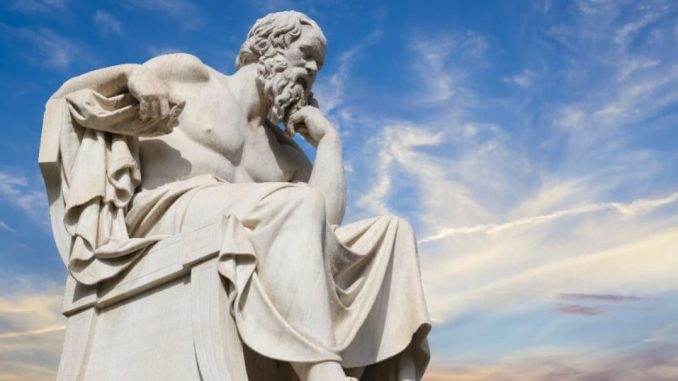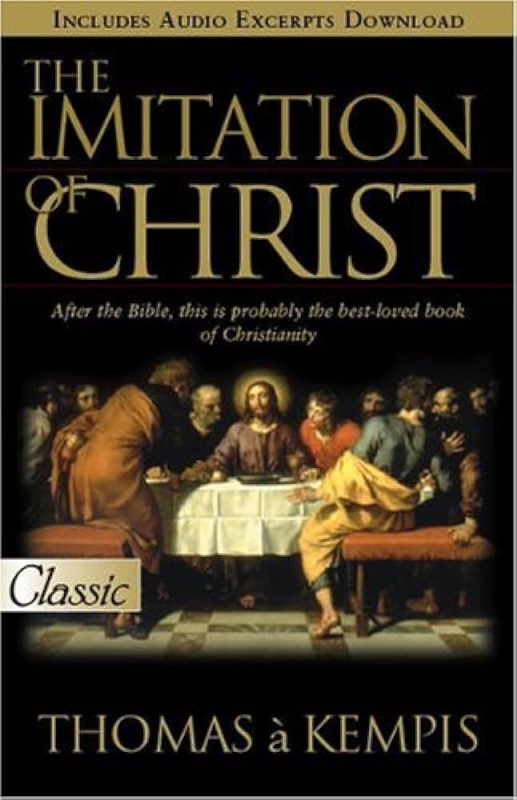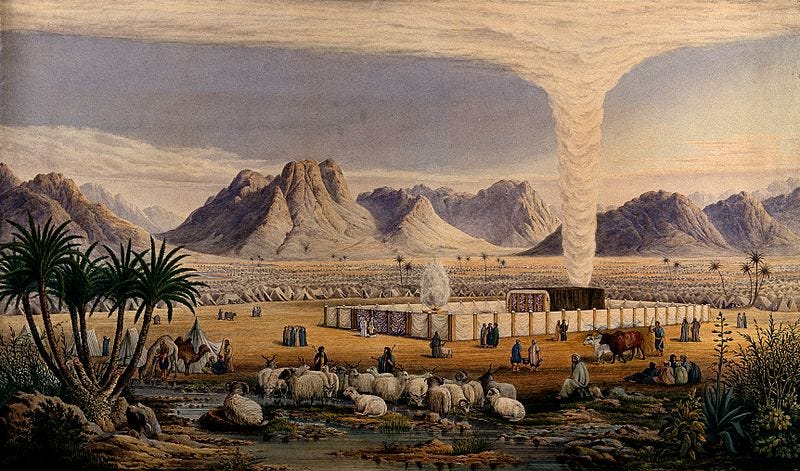
Recently, I had an interesting experience reading Thomas a Kempis’s ‘The Imitation of Christ’. The book is renowned for its influence in the Christian faith, the most widely read devotional work, coming second only to the Bible. The practice of imitation of Christ is a key one in our faith and you will find it in the writings of such important figures as Augustine, going all the way back to the Apostle Paul.
Yet, while reading Thomas a Kempis’s work, what struck me was an air of melancholic resignation. Its viewpoint is of such a fallen world and humanity that there’s nothing of value except to flee and find refuge in God and separation from the world. There is much wisdom in the little book though it comes as tough medicine. And I wondered why, unlike Augustine’s Confessions, which I felt was a powerful work, this one did not come across quite that way. I understood why it was so beloved but it felt like the book had only one hardline trajectory.

And then I realised that the whole work was about penitence, the discipline towards holiness, and the cultivation of the ‘inner man’. There was not an iota of mention about the work of the Holy Spirit, Christ’s mediation work as the God-man, the role of the Church in this world, and nothing at all about God’s redemptive work. It finds communion with God not through intimacy with the Holy Spirit, but through the Sacraments such as the Eucharist.
In truth, the language in The Imitation of Christ isn’t far off from that in many major spiritual classics. It made me think about The Analects but the Swami Vivekananda found echoes in it from the Bhagavad Gita and some have found echoes from the Upanishads with their theology of the Maya. There might be something deeply spiritual here for cultures so far apart from each other coming to the same insight. However, while Thomas a Kempis’s work is particularly influential in Catholic theology, it was a Catholic theologian who criticized it such:
It rejects and eliminates every speculative element not only of scholasticism but also of mysticism, and yet, at the same time, it abstracts from the colourful multiplicity of the Bible and – since it is written for those who have turned from the world – disregards the world, in all its richness, as a field for Christian activity… In place of the openhearted readiness of a Catherine of Siena, a subdued and melancholy resignation runs through the book…. [T]here is an excess of warnings about the world, the illusions of egoism, the dangers of speculation and of the active apostolate. In this way, even the idea of the imitation of Christ does not become the dominant perspective. There is no mention of the mediation of the God-man, of access through Christ, in the Holy Spirit, to the Father. The mystery of the Church, therefore, does not come into view either. The individual is unaware that his love of God can only be fulfilled if it expands into love of neighbor and into the apostolate. All [that] remains is a flight from the world, a world that has not been brought home in Christ.
In fact, The Imitation of Christ isn’t telling us anything new. The Book of Ecclesiastes had gone over the same existential questions about the meaningless and worthlessness of human endeavours eras before. All of us work towards something and yet all of us will die someday, fortunes fluctuate and are seldom stable, and everything decays. What is the value in such transient things? But the trajectory of Ecclesiastes is markedly different. In light of this perceived meaninglessness, the writer of Ecclesiastes suggests
that human beings should enjoy the simple pleasures [key phrase] of daily life, such as eating, drinking, and taking enjoyment in one’s work, which are gifts from the hand of God. The book concludes with the injunction to “Fear God and keep his commandments; for that is the duty of all of mankind. Since every deed will God bring to judgment, for every hidden act, be it good or evil. [Recognise everything comes from God. We are born with nothing, we carry away nothing. Honour God and build your intimacy with Him.]”
What gave rise to the differences between The Imitation of Christ and The Book of Ecclesiastes? I think many of us are aware of the Platonic influences in our theology. In the allegory “The Cave“, Plato describes different levels of reality. According to him, we are like people chained to the wall of a cave all our lives, facing a blank wall. We see shadows projected from objects onto that wall but we do not see the Ideal and true forms – the accurate representations of the world or the Truth. All our lives our senses feed us images and auditory sensations but all we perceive are only shadows.


In the Christian context, this is called “Christoplatonism“. It refers to a dualism opined by Plato, that the spirit is good but matter is evil. The ideas of this Platonic Christianity was as follows: “The aim of life is to leave this world and get to heaven. The physical is bad/neutral so we need to concentrate on the spiritual things. Jesus ‘saves our souls’. We should spend our lives getting other souls saved.”
For the Hebrew people, it was not like that. God was involved in their every activity, including leisure, and He is very much inter-weaved with everything that happens in their world. It was a very holistic thing.

A friend shared with me, “In my early years as an active Christian I was impressed with this idea that it’s the work of the Holy Spirit working out God’s salvation in us and transforming us into Christ’s image. [I realise] mere imitation of Christ externally by means of good works is not enough for our salvation.”
2 Corinthians 3:18
And we all, with unveiled face, beholding the glory of the Lord, are being transformed into the same image from one degree of glory to another. For this comes from the Lord who is the Spirit.
Ephesians 2:8-9
For by grace you have been saved through faith. And this is not your own doing; it is the gift of God, not a result of works, so that no one may boast.
She reflected, “I think over the years a lot of the Christian ideas and understanding of the Bible became progressively experiential or meditative disconnected from the Judaic culture and background of the original texts. The proper context for interpreting the Bible is the context of the biblical writers—the context that produced the Bible.”
The book The Unseen Realm: Recovering the Supernatural Worldview of the Bible shares;
“Creeds serve a useful purpose. They distill important, albeit carefully selected, theological ideas. But they are not inspired. They are no substitute for the biblical text. The biblical text was produced by men who lived in the ancient Near East and Mediterranean between the second millennium BC and the first century AD. To understand how biblical writers thought, we need to tap into the intellectual output of that world. A vast amount of that material is available to us, thanks to modern technology. As our understanding of the worldview of the biblical writers grows, so does our understanding of what they intended to say—and the mosaic of their thinking takes shape in our minds.”
Imagine this worldview (adapted from Jonswales blog @jonswales77):
As Christians we celebrate God’s creation by participating in it. God delights in people enjoying His creation. Wine, for instance, is a good gift and should be enjoyed as such, but we should beware of distorting the gift through drunkenness.

The purpose of life is to glorify God. God is glorified when we celebrate creation and work for its redemption. We should be involved in evangelism but its goal is to lead people to the abundant life with Christ and Christianity is not simply about getting others saved.
We look forward to God coming to reign on earth, the resurrection of our bodies, we look forward to an eternity of playing, food, culture… praising Jesus… exploration… and not just thinking solely about how to escape this world so that we can get into Heaven.
The church is one important aspect of life. However, Family, Work, Leisure, etc are equally as important.

God calls people to all aspects of work and people should see their work as being a part of their Christian life.
Christianity becomes life-embracing and not world-rejecting. I am not saying The Imitation of Christ has no value but it only tells half the story. I personally believe that the key theme of the Christian story is a redemptive one.

We have a full and abundant life under Christ and we have good gifts from God. Recognise this and treat them as such, not taking them for granted, but also rejoicing in those gifts and giving thanks to Him daily for our position in Christ and as God’s children.
While in this world, we have privileged roles to play as God’s partners, and it is not to flee from the world. I feel it’s time we return to the foundations of our beliefs, go beyond our creeds and denominational lines, and embrace our abundant lives in the Family of God, recognising that hardship will come at times, but being secure in Christ, just as the Early Church did.
Note: This article was written with the intended purpose to foster discussion. It takes a neutral stance and is not meant to be seen as an argument against any doctrinal positions. The writer believes that one of the good aspects of the Christian faith is that we are called to discuss and examine every argument about facets of our faith in an open-minded and civil manner.
|Share The Good News|




Having read Kempis many times, I feel it is being misrepresented here. Thanks
You may have your reasons for feeling this way but this was the impression I had while reading the book and it’s my response to it. As I mentioned, I am not saying it teaches the wrong doctrines and I have no argument with the practise of the imitation of Christ. I found Paul’s and Augustine’s teachings on it beneficial and I personally feel the wisdom in Ecclesiastes edifying. I just don’t agree with Kempis’s approach. I am saying it’s only telling half the story and you will find many similar responses (you can search for them online for ease) among others. The passage I quoted from a Catholic theologian is real.
.
I understand Kempis was writing within the context of his times and it may have shaped his monastic viewpoints. But Christ did not call us to withdraw from the world. He issued us the Great Commission and we have active roles in this world. It was also written during the Middle Ages in which Platonism was a very strong influence. I am not the only one who has found problems with the Christo-platonic viewpoint, though I do realise Augustine, a theologian I respect, was influenced by Platonism as well.
.
If anything of what I shared edifies you then I hope you will be blessed by it. But my feedback remains. Nothing other than the Bible/Scripture and no one other than God (not even Kempis or the Pope) is infallible.